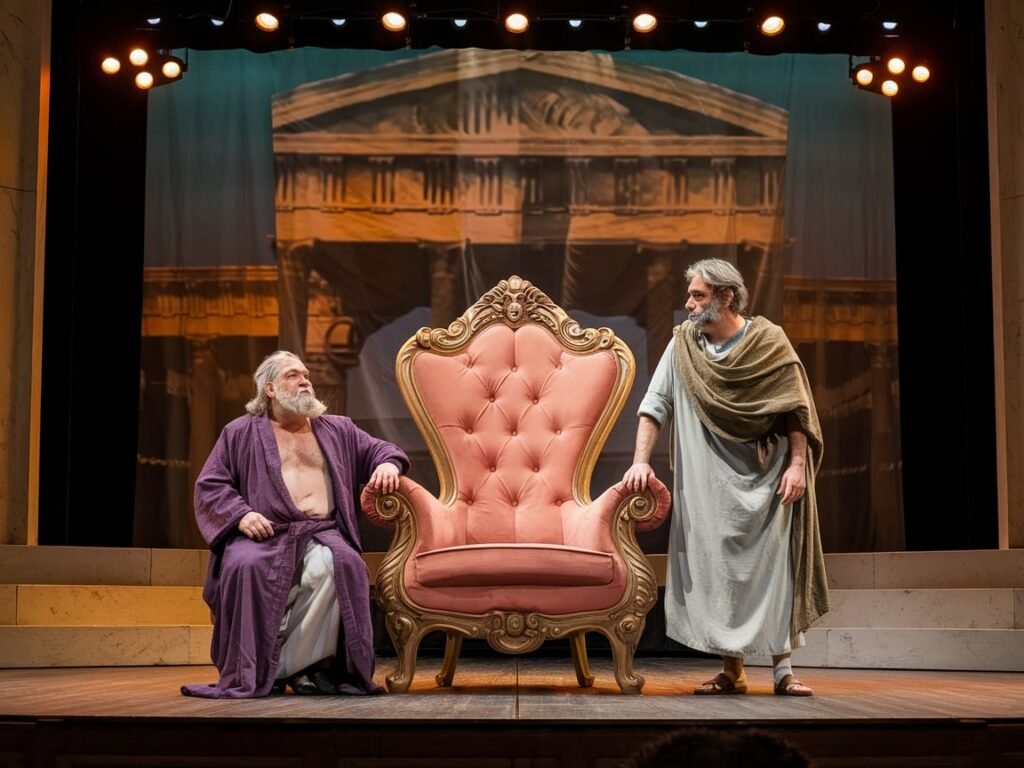William Shakespeare‘s “Julius Caesar” stands as one of the most compelling political dramas in the history of theater. First performed around 1599, this timeless play explores themes of ambition, loyalty, and the complexities of power that continue to resonate with audiences today. In this comprehensive exploration of “Julius Caesar,” we’ll delve into its plot, themes, characters, historical context, literary significance, and enduring impact on culture and politics.
The Plot: A Conspiracy Unfolds
Set in ancient Rome, “Julius Caesar” tells the story of the assassination of the titular character and its aftermath. The play opens with Caesar’s triumphant return to Rome after defeating Pompey. As Caesar’s power and popularity grow, a group of senators, led by Cassius and Brutus, become concerned about his ambition and the threat he poses to the Roman Republic.
The conspirators convince Brutus, a respected figure and Caesar’s friend, to join their plot. On the Ides of March, they assassinate Caesar at the Senate, famously uttering “Et tu, Brute?” as he falls. Mark Antony, Caesar’s loyal friend, turns the tide of public opinion against the conspirators with a masterful funeral oration.
The latter half of the play depicts the civil war that erupts following Caesar’s death, culminating in the defeat of Brutus and Cassius at the Battle of Philippi. The play ends with Brutus committing suicide and Antony paying tribute to him as “the noblest Roman of them all.”
Themes: The Complexities of Power and Morality
“Julius Caesar” is renowned for its exploration of political themes that remain relevant in modern times:
1. Ambition and Its Consequences
The play examines the dangers of unchecked ambition, both in Caesar’s rise to power and in the motivations of the conspirators.
2. The Conflict Between Public and Private Selves
Characters struggle with balancing their personal loyalties and their perceived duty to the state, most notably seen in Brutus’s internal conflict.
3. The Power of Rhetoric
The play showcases the ability of skilled orators to sway public opinion, particularly evident in the speeches of Brutus and Mark Antony.
4. The Fickleness of the Masses
Shakespeare portrays the Roman public as easily swayed, raising questions about the nature of democracy and populism.
5. Fate vs. Free Will
The play grapples with the tension between predestination and individual choice, symbolized by various omens and prophecies.

Characters: A Cast of Historical Figures
“Julius Caesar” features a rich array of characters drawn from Roman history:
Julius Caesar
The titular character, whose assassination is the central event of the play. Caesar is portrayed as a complex figure, both ambitious and vulnerable.
Marcus Brutus
The tragic hero of the play, Brutus is torn between his loyalty to Caesar and his perceived duty to Rome. His internal struggle forms the emotional core of the drama.
Caius Cassius
The primary instigator of the conspiracy against Caesar. Cassius is portrayed as shrewd and manipulative, driven by both political ideology and personal envy.
Mark Antony
Caesar’s loyal friend who masterfully turns the tide of public opinion against the conspirators. His famous “Friends, Romans, countrymen” speech is one of the play’s most memorable moments.
Calpurnia and Portia
The wives of Caesar and Brutus, respectively. These characters provide insight into the personal lives of the main characters and serve as voices of caution and intuition.
Historical Context and Shakespeare’s Interpretation
While based on historical events, Shakespeare’s “Julius Caesar” takes significant liberties with the timeline and details of Caesar’s assassination and its aftermath. The play compresses events that occurred over several years into a matter of days, creating a more dramatic narrative structure.
Shakespeare’s primary source for the play was Plutarch’s “Lives of the Noble Greeks and Romans,” which he adapted and expanded upon. The playwright’s interpretation of these events reflects not only the historical context of ancient Rome but also the political climate of Elizabethan England.
Literary Significance and Influence
“Julius Caesar” is considered one of Shakespeare’s most important works, particularly for its exploration of political themes:
Political Commentary
The play has been interpreted as a commentary on the dangers of tyranny and the complexities of political change, themes that were particularly relevant in Shakespeare’s time and continue to resonate today.
Psychological Depth
Shakespeare’s nuanced portrayal of characters like Brutus and Cassius showcases his ability to create complex, multidimensional personalities.
Linguistic Brilliance
The play is filled with memorable lines and speeches that have become part of the cultural lexicon:
- “Beware the Ides of March”
- “Et tu, Brute?”
- “Friends, Romans, countrymen, lend me your ears”
- “The fault, dear Brutus, is not in our stars, but in ourselves”
Dramatic Structure
The play’s structure, with its climactic assassination occurring in the middle rather than at the end, was innovative for its time and influenced subsequent dramatists.

Interpretations and Adaptations
The richness of “Julius Caesar” has inspired numerous interpretations and adaptations over the centuries:
Stage Productions
From traditional Roman settings to modern reinterpretations, “Julius Caesar” has been a staple of theater companies worldwide. Notable productions have set the play in various historical periods to draw parallels with contemporary political situations.
Film Adaptations
Several filmmakers have brought their vision of “Julius Caesar” to the screen:
- Joseph L. Mankiewicz’s 1953 film starring Marlon Brando as Mark Antony
- Stuart Burge’s 1970 version featuring Charlton Heston and John Gielgud
- The BBC’s 2018 modern-dress adaptation set in present-day Rome
Literary and Cultural References
The play has inspired countless references in literature, popular culture, and political discourse:
- Robert Graves’ historical novel “I, Claudius” draws on themes from the play
- The assassination of Caesar has become a cultural shorthand for political betrayal
- Phrases from the play are often quoted in political speeches and debates
Themes in “Julius Caesar” Relevant to Modern Audiences
Despite its ancient setting, “Julius Caesar” explores themes that remain highly relevant in contemporary politics and society:
The Nature of Political Power
The play’s examination of how power is gained, wielded, and lost speaks to ongoing debates about political systems and leadership.
The Ethics of Political Violence
The conspirators’ decision to assassinate Caesar raises questions about the justification of violence for political ends, a topic that continues to be debated in modern contexts.
Media Manipulation and Public Opinion
The speeches of Brutus and Antony demonstrate the power of rhetoric to shape public perception, a theme that resonates in our age of mass media and political spin.
The Role of the Individual in Political Change
Through characters like Brutus, the play explores the responsibility of individuals to act on their political convictions, even at great personal cost.
Teaching “Julius Caesar” in the Modern Classroom
Educators face both challenges and opportunities when introducing “Julius Caesar” to students:
Challenges:
- The historical setting may feel distant to some students
- The language can be challenging for modern readers
- The political themes require careful handling in diverse classrooms
Opportunities:
- The play provides a springboard for discussions about current political issues
- Comparing ancient Roman politics with modern systems can deepen students’ understanding of political structures
- The play’s themes of friendship, loyalty, and moral dilemmas are relatable to students’ personal experiences

The Enduring Legacy of “Julius Caesar”
“Julius Caesar” remains a cornerstone of literature and political drama for several reasons:
Universal Themes
The play’s exploration of power, ambition, and moral responsibility speaks to fundamental aspects of human nature and society.
Complex Characters
The depth and ambiguity of characters like Brutus and Antony continue to fascinate audiences and invite multiple interpretations.
Political Relevance
The play’s themes of political manipulation, populism, and the fragility of democratic institutions remain strikingly relevant in modern times.
Linguistic and Dramatic Power
Shakespeare’s mastery of language and dramatic structure ensures that “Julius Caesar” remains a powerful and engaging work of art.
Conclusion: The Timeless Drama of Power and Betrayal
William Shakespeare’s “Julius Caesar” stands as a testament to the enduring power of great literature to illuminate the complexities of human nature and politics. Its exploration of ambition, loyalty, and the moral challenges of leadership continues to resonate with audiences more than four centuries after its first performance.
From the stages of London’s Globe Theatre to high school classrooms around the world, “Julius Caesar” continues to provoke thought, debate, and reflection on the nature of power and the responsibilities of citizenship. Its nuanced portrayal of historical figures grappling with timeless moral dilemmas offers viewers and readers a lens through which to examine their own society and political landscape.
Whether encountered on the page, stage, or screen, “Julius Caesar” challenges us to consider the delicate balance between personal ambition and public good, the power of persuasion in shaping public opinion, and the consequences of political action. In doing so, it reminds us of the enduring relevance of classical literature in understanding and navigating the complexities of our modern world.
As we continue to grapple with questions of leadership, democracy, and political ethics in our own time, Shakespeare’s “Julius Caesar” remains a powerful and insightful guide, inviting us to reflect on the timeless challenges of governance and the human condition.





